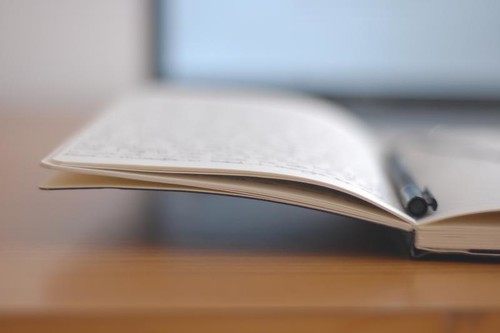In a different time and a different culture, the stories of a people passed down through the generations orally. Here in twenty-first century America, the written word reigns supreme, whether on paper on in pixels. Much of our family history, however, exists only in memory, tradition, and speculation.
Any given family likely has at least one person who researches genealogy, but one person can only do so much. Each of us has our own voice and our own view of the world; one researcher per extended family can never hope to capture everyone's stories. We all have countless stories to tell; why not record yours for the generations to come?
 |
| notebook by derya CC-BY 2.0 |
If we have questions about how our great-grandparents lived, how much more will our great-grandchildren muse about our lives in the early twenty-first century? To leave a legacy for future generations and explain how they came to be who they will become, we should take steps to record our personal history and experiences.
Daunting? Certainly, but I don't think it has to be.
But I'm not a genealogist!
You don't need a degree, a certification, or even a library card to start recording your own family history. Start with what you know -- yourself, your parents, your kids -- and work from there. Write your story and worry about the technical genealogy stuff later. If you never get past recording the story of your own life, then the genealogy world will still be richer for it.
But I'm not a writer!
Again, you don't need to know the finer points of character development or how to properly use the Oxford comma in order to tell your story. Just get your memories out of your head and onto something physical: a page, a computer, or an audiotape. If you're visually inclined, paint a picture or shoot a video, then describe why it tells your family's story. Your descendants will thank you for whatever effort you spend in recording your history.
Genealogy is boring - all those dates and places get me lost.
There are a lot of dry facts involved with genealogy and there are a lot of rules that people put forth on how to keep all of that data organized. Names, dates, and places are the skeleton of a family's history - without them there is no structure. To many, just looking at a skeleton is boring, and perhaps a little morbid. We are much more comfortable looking at a person's eyes, skin, hair - the flesh that presents an attractive face to the world. That flesh, though, relies on the skeleton for attachment, something to anchor the whole body together.
I suggest that if you find the basic names, dates, and places too dry, you start with the stories of your family. Write about your high school years or your mom's fried chicken. Record the memories of your kids' first vacation or that time your dad took you fishing. The vital records will come, but for now just start writing and see if you don't get hooked by your own family story.
Next time: an introduction to your host and the reason for this blog
Image Credit: Derya on Flickr.com
No comments:
Post a Comment